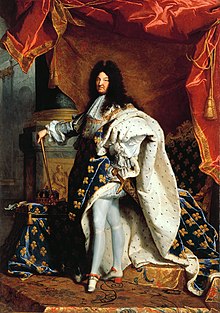Louis is the French form of the Old Frankish given name Chlodowig and one of two English forms,[1] the other being Lewis (/ˈluːɪs/).

| |
| Pronunciation | /ˈluːi/ LOO-ee /ˈluːɪs/ LOO-iss French: [lwi] |
|---|---|
| Gender | Male |
| Language(s) | French and English |
| Origin | |
| Word/name | French |
| Meaning | "Famed warrior" or "loot bringer" |
| Other names | |
| Derived | Louise |
| Related names | Louie, Clovis, Lewis, Ludovico, Luigi, Luis, Ludvig, Ludwig, Lodewijk, Lodewyk, Alois |
| See also | Lothar Robert, name with a similar meaning |
The name Louis (through the intermediate form Clovis) derives from the Frankish name ᚺᛚᛟᛞᛟᚹᛁᚷ (inrunic alphabet) or *Hlōdowik or *Hlōdowig (inLatin alphabet). Traditionally, this name is considered to be composed of two elements, deriving from both Proto-Germanic *hlūdaz ("loud, famous") and *wiganą ("to battle, to fight") respectively, resulting in the traditional practice of translating Clovis' name as meaning "famous warrior" or "famous in battle".[2]
However, scholars have pointed out that Gregory of Tours consequently transcribes the names of various Merovingian royal names containing the first element as chlodo-. The use of a close-mid back protruded vowel (o), rather than the expected close back rounded vowel (u) which Gregory does use in various other Germanic names (i.e. Fredegundis, Arnulfus, Gundobadus, etc.) opens up the possibility that the first element instead derives from Proto-Germanic *hlutą ("lot, share, portion"), giving the meaning of the name as "loot bringer" or "plunder (bringing) warrior". This hypothesis is supported by the fact that if the first element is taken to mean "famous", then the name of Chlodomer (one of Clovis' sons) would contain two elements (*hlūdaz and *mērijaz) both meaning "famous", which would be highly uncommon within the typical Germanic name structure.[3][4]